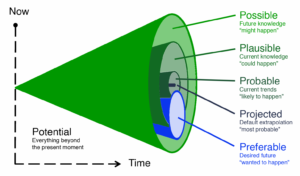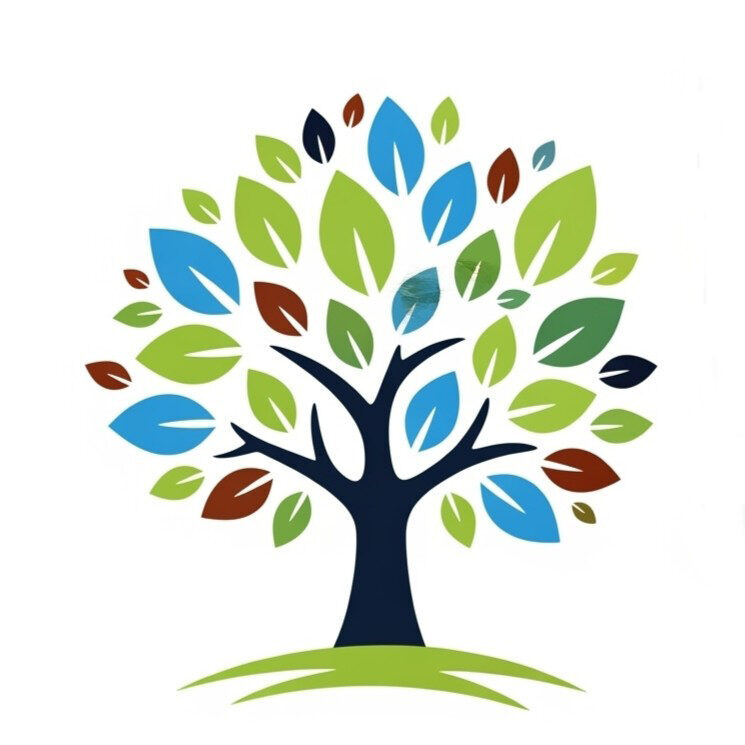Project
FUTURING KNOWLEDGE INSTITUTIONS – HVA2030: WHAT WILL THE FUTURE HOLD FOR HVA AS A KNOWLEDGE INSTITUTION?
Hi, we are Team Mirai 👋 We invite you to together pursue an alternate future scenario of higher education.
In February 2022, five researchers and designers met at the Digital Society School. All with different backgrounds, from different countries, but with the same ambition: disrupting education.
A week later, we were given this complex, yet intriguing Design Challenge: how can we envision alternate futures of Amsterdam University of Applied Scieneces (AUAS)/Hogeschool van Amsterdam (HvA) not only as a knowledge institution but also to fulfill social tasks as a metropolitan university of applied sciences in 2030?
With Speculative Design as a tool, we envision the HvA as a resilient, future-proof and open knowledge institution which situated itself as part of (Metropolitan) Amsterdam – a city as a learning playground, and we translate the vision to the now to make robust steps.
Why relevant?
We are experiencing significant challenges in how we study, work and live every day. These challenges are posed by numerous global uncertainties such as political disorders, climate crisis and hazardous pandemics. Moreover, we have a massive skills shortage as more than 1 billion people need to be reskilled before 2030. Educational institutions play a significant role in preparing the next generation for what’s to come.
After all the theoretical conversations, not only about how it might look like in the future, but also about the very nature of education and what we need to achieve a better future, we came to process philosophical and conceptual thoughts into design practices – in 20 weeks.
What is Speculative Design?
We used Speculative Design as an overarching method for our project. It is a research approach that questions the current challenges and makes us envision from a possible to preferable far future, rather than focusing only on the probable one. Then we bring it down (backcasting) to the near future so that we can think of actions to take to achieve preferable scenarios.

Future Cone, developed by Voros (2003)
Our process 🚀
Our project was divided into 3 parts: EXPLORE, IMAGINE, and MAKE phases.
Explore: to research the role of the university as a knowledge institution in Amsterdam and the city’s potential to become a learning playground as well as the drivers and trends which surround learning. For this, we read, talked with various stakeholders in the HvA, went out to the city and talked to citizens, made a card game, and more.
Imagine: to develop 5 different future personas and 3 scenarios in order to tell a compelling story of 2030.
Make: to make a future tangible by inspiring the HvA ecosystem, its partners and citizens through developing a set of principles and beliefs that guide individuals through rethinking today’s societal roles and actions while shaping a meaningful tomorrow by developing an accompanying platform which allows them to exchange knowledge and experiences and join hands on important topics.
Do we have answers to the design challenge? Well, we have more questions 🤔
What is an open knowledge institution anyway? Open knowledge institutions are institutions where 1) people share knowledge freely and 2) that are available to the public. Currently many organizations keep their knowledge to themselves. If we could build on top of each other’s knowledge, rather than having numerous different small projects, we can forward knowledge for the collective good. Openness also refers to providing their physical/virtual space to the citizens of the city. It is a public university after all. How can we make a place where citizens of all ages with different backgrounds can visit and converse about their passion and find potential collaboration?
Such a place will bring about a sense of belonging – which is an important feeling for people to have in their learning environment. Can we include different perspectives in the curriculum, or can we make a place where everyone feels welcomed and inspired?
Most of us have probably heard of the concept of personalized learning, especially with the current development of AI, customization of individuals’ learning paths has been rapidly advanced. However, what happens if we completely make our learning personal? No collaboration? We believe maintaining the balance between personalized learning and learning together in collaboration is the key to being resilient in the future. Should we strive for semi-personalized learning?
We’ve learned many things in the past – but not necessarily in the right way, and skills we gained get outdated. Can we become brave to unlearn our stale way of learning and knowledge to relearn? How would society look like if we keep learning to learn and to unlearn?
It’s not about us, it’s about the community.
We’ve started the research and envisioning the future of the HvA. But it is time to make it tangible.
Currently, disconnectedness among initiatives, and rather hierarchical structure are hindering the knowledge institutions to come closer to the preferable future.
So, our team aims at making HvA a resilient future-proof metropolitan knowledge institution by:
- Providing scalable and practical guiding principles which nurture a rich stimulating learning environment where individuals become life-long learners;
- Fostering a strong (symbiotic) relationship between the university and the city of Amsterdam while leveraging the city as a learning playground; and
- Focusing on collective values that lead to disruptive social innovation
Our proposal to make a change is in the guiding principles that faculties and individuals can follow and act upon. Additionally, we will open-source all our research so that you can benefit from it – regardless of the roles, age, status in any way. Our research does not orient around solutions, it is about social innovation – a paradigm shift necessary to take a step towards a preferable future.
But what can we do NOW to make it happen? To start a conversation and immerse you in the realm of 2030. Join the Final Showcase on 15 June at Digital Society School to sense the future. Become part of a genuinely future-oriented learning community.

Connection with the EdTech for Social Change Track
The EdTech for Social Change track is a connective hub that opens space for partnerships, applied research and projects with industry stakeholders. Together we use technology to boost individual learning, corporate training and to make learning accesible to to all including vulnerable social groups.
The foundation of the ambitions of HvA for the coming years is formed by the mission and vision of our organisation and by the social task that the AUAS fulfils as a metropolitan university of applied sciences.

Connection with the Sustainable Development Goals
The United Nations SDG’s are the “blueprint to achieve a better and more sustainable future for all. They address the global challenges we face”.
Following SDGs will be further explored in this project:
5. Gender Equality….
8. Decent work & economic growth…
10. Reduced inequalities…
11. Sustainable cities & communities…
17. Partnerships for the goals…


